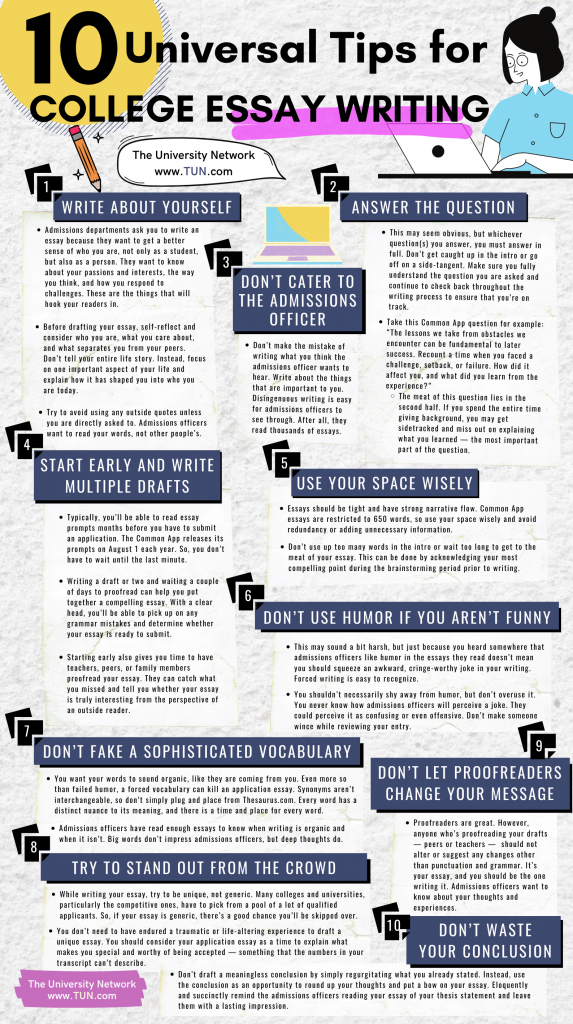Writing a college essay can be intimidating, particularly if you consider yourself to be a math or science person and not a stellar writer. But don’t be too worried. Although grammar and style do play a role in how admissions officers interpret your essay, it’s the content of your essay that matters most.
Essays give you the opportunity to set yourself apart from the crowd and show college admissions committees who you truly are and what you’re interested in.
These following tips can help steer you in the right direction so you can leave a lasting impression on admissions officers and boost your chances of being accepted into your dream school.
1. Write about yourself
Admissions departments ask you to write an essay because they want to get a better sense of who you are, not only as a student, but also as a person. They want to know about your passions and interests, the way you think, and how you respond to challenges. These are the things that will hook your readers in.
“Schools are really trying to gain insights into what the passions and interests of a student are,” Rodney Morrison, the Associate Provost for Enrollment and Retention Management at Stony Brook University, told The University Network (TUN).
Before drafting your essay, self-reflect and consider what you care about. You shouldn’t tell your entire life story. Instead, try to focus on one or two important aspects of your life that have helped shape you, and be sure to write in your natural voice.
“(T)he best essays we read are those where the genuine voice of a high school student (that’s you) comes through loud and clear and we really get a sense of who you are,” Hannah Mendlowitz, a Senior Assistant Director of Admissions and Director of Recruitment at Yale University, wrote in a Yale blog.
“I do have favorite essays that I can remember, but they have no particular topic in common,” she added. “Instead, they are the ones where at the end I have a grasp on what it might be like to have a conversation with the writer, to be in the same room as them.”
Additionally, make sure you try to avoid using any outside quotes unless you are directly asked to. Admissions officers want to read your words, not other people’s.
On its website, Johns Hopkins University lists several examples of essays its admissions department found impressive during the last admissions cycle. Those essays are available here.
2. Answer the question
This may seem obvious, but whichever essay prompt(s) you answer, you must answer in full. Don’t get caught up in the intro or go off on a side-tangent. Make sure you entirely understand the question you are asked and continue to check back throughout the writing process to ensure that you’re on track.
Essay questions are carefully worded and intended to encourage students to explore and explain a specific thought or belief. So, incomplete answers would be detrimental to the way admissions officers perceive your response.
Take this Common App question for example: “The lessons we take from obstacles we encounter can be fundamental to later success. Recount a time when you faced a challenge, setback, or failure. How did it affect you, and what did you learn from the experience?”
The meat of this question lies in the second half. If you spend the entire time giving background, you may get sidetracked and miss out on explaining what you learned — the most important part of the question.
3. Don’t cater to the admissions officer
Don’t make the mistake of catering your writing to admissions officers instead of writing from the heart. Disingenuous writing is easy for admissions officers to see through. After all, they read thousands of essays.
“Don’t write about what you think the admissions office wants to hear. Really write about the things that are important to you,” Morrison told TUN. “That’s really what (admissions officers) want to get out of it … the things that are important to the students, not what the student thinks the admissions officers want to hear.”
4. Start early and write multiple drafts
Typically, you’ll be able to read essay prompts months before you have to submit an application. The Common App typically releases its prompts on August 1 each year. For the 2020-21 cycle, however, the Common App has already announced that the essay prompts will be the same as in the 2019-20 cycle.
Writing a draft or two and waiting a couple of days to proofread can help you put together a compelling essay. With a clear head, you’ll be able to pick up on any grammatical mistakes and determine whether your essay is ready to submit.
Starting early also gives you time to have teachers, peers, or family members proofread your essay. They can catch what you missed and tell you whether your essay is truly interesting from the perspective of an outside reader.
5. Use your space wisely
Typically, essays shouldn’t exceed 650 words, which is the cap set by the Common App. And some colleges and universities that have their own essay prompts, like Yale, ask applicants to answer questions in as few as 35 words.
So, essays need to be tight and have strong narrative flow. Don’t use up too many words in the intro or wait too long to get to the meat of your essay. This can be done by acknowledging your most compelling point during the brainstorming period prior to writing.
6. Don’t use humor if you aren’t funny
This may sound a bit harsh, but just because you heard somewhere that admissions officers like humor in the essays they read doesn’t mean you should squeeze an awkward, cringe-worthy joke in your writing. Forced writing is easy to recognize.
“If you’re not a humorous writer . . . now is probably not the best time to try it,” Morrison told TUN.
If you feel that humor is your strong suit, you don’t need to necessarily shy away from it, but don’t overuse it. You never know how admissions officers will perceive a joke. They could perceive it as confusing or even offensive. Don’t make someone wince while reviewing your entry.
7. Don’t fake a sophisticated vocabulary
You want the words you include in your essay to sound organic. Even more so than failed humor, a forced vocabulary can kill an application essay.
“Don’t try to use really big SAT words if you don’t typically use them,” Morrison told TUN. “You really want it to sound like it’s coming from you.”
Synonyms aren’t interchangeable, so don’t simply plug and place from Thesaurus.com. Every word has a distinct nuance to its meaning, and there is a time and place for every word.
Admissions officers have read enough essays to know when writing is organic and when it isn’t. Big words don’t impress admissions officers, but deep thoughts do.
8. Try to stand out from the crowd
You should always view your college essay as your opportunity to stand out from the crowd. So, while writing your essay, try to be unique, not generic.
“Most schools — particularly competitive schools — they are really trying to pick and choose between a lot of qualified applicants,” Morrison told TUN. “If you’re generic and (admissions officers) can’t tell the difference between you, someone else, and the other thousands of applicants, it doesn’t do you a good service.”
You don’t need to have endured a traumatic or life-altering experience to draft a unique and memorable essay. You should consider your application essay as an opportunity to help the admissions officers evaluating your application develop an understanding of who you are and what makes you stand out — something that the numbers in your transcript can’t describe.
9. Don’t let proofreaders change your message
Proofreaders are great. However, peers or teachers — or anyone else proofreading your drafts — should not alter or suggest any changes other than punctuation and grammar. It’s your essay, and you should be the one writing it. You’re the applicant, and admissions officers want to know about your thoughts and experiences.
“Revise and edit, but be sure not to lose the sense of individuality that only you can put into words,” Mendlowitz wrote. “Have someone proofread, but don’t get too much help. My colleagues and I can tell when an essay is written more by a parent or, dare I even say it, a college consultant than by a student – and I can promise you that those pieces are not very good.”
10. Don’t waste your conclusion
Don’t draft a meaningless conclusion by simply regurgitating what you already stated. Instead, use the conclusion as an opportunity to round up your thoughts and put a bow on your essay. Eloquently and succinctly remind the admissions officers reading your essay of your thesis statement and leave them with a lasting impression.
For more college application advice, check here.
Conclusion
Don’t underestimate the importance of a college essay. If you’re applying to selective institutions especially, the essay is what can set you apart from a crowded pool of other qualified applicants. Take the essay seriously, start early to give yourself time, and follow the tips in this article.




